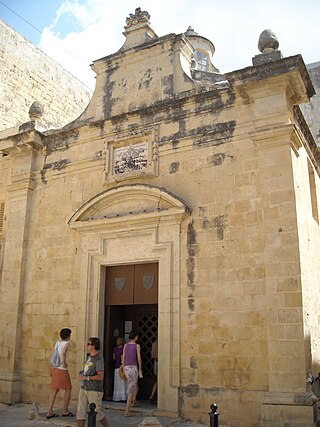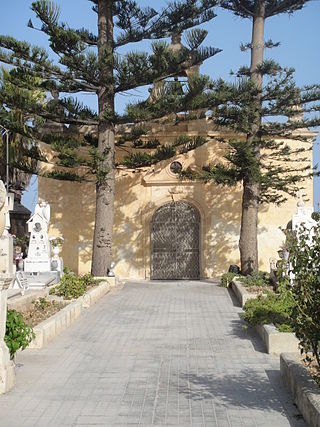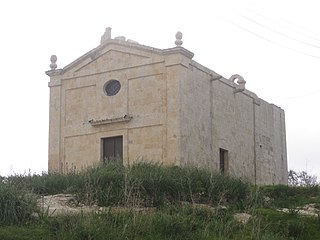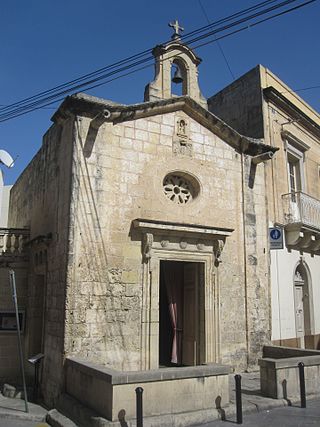Related Research Articles

Żurrieq is a town in the Southern Region of Malta. It is one of the oldest towns in the country, and it has a population of 11,823 inhabitants as of March 2014. Żurrieq is one of the 10 parishes to be documented in 1436 and it is dedicated to Saint Catherine. The island of Filfla is administratively a part of the town. The town stretches from Nigret to Ħal Far. In old times the town was had a border with Żejtun. The village of Qrendi used to be part of the parish of Żurrieq until 1618 when it was made into its own parish.

The Basilica of the National Shrine of the Blessed Virgin of Ta' Pinu is a Roman Catholic minor basilica and national shrine located some 700 metres (2,300 ft) from the village of Għarb on the island of Gozo, the sister island of Malta.

Fra' Jean l'Evesque de la Cassière was the 51st Grand Master of the Order of Malta, from 1572 to 1581. He commissioned the building of the Conventual Church of the Order in Valletta, Malta, and is buried in its crypt.

The Inquisitor's Palace, also known as the Sacred Palace, is a palace in Birgu, Malta. It was the seat of the Maltese Inquisition from 1574 to 1798, under the name Palazzo del Sant'Officio. The building was originally constructed as a courthouse known as the Castellania in the early 16th century, but little remains of the original building due to major alterations and renovations carried out in the subsequent centuries.

Hospitaller Malta, officially the Monastic State of the Order of Malta, and known within Maltese history as the Knights' Period, was a polity which existed between 1530 and 1798 when the Mediterranean islands of Malta and Gozo were ruled by the Order of St. John of Jerusalem. It was formally a vassal state of the Kingdom of Sicily, and it came into being when Emperor Charles V granted the islands as well as the city of Tripoli in modern Libya to the Order, following the latter's loss of Rhodes in 1522. Hospitaller Tripoli was lost to the Ottoman Empire in 1551, but an Ottoman attempt to take Malta in 1565 failed.

Domenico Cubelles was a Spanish Roman Catholic prelate who served as Bishop of Malta from 1541 till his death in 1566.

The Church of St Bartholomew is a Roman Catholic Parish church in the village of Għargħur, Malta.

Santa Luċija is a hamlet in Kerċem, in Gozo Island, Malta.

The Chapel of St Matthew, popularly known as San Mattew Iż-Żgħir, literally meaning Saint Matthew the smaller, is a small medieval chapel located beside a larger church with the same name in an area known as il-Maqluba in Qrendi, Malta. The use of the word the smaller is used that one would not confuse it with the larger St Matthew's church.

The Chapel of St Agatha is a small Roman Catholic church located in the medieval city of Mdina, Malta.

The Chapel of St Bartholomew is a Baroque Roman Catholic chapel located in Żurrieq, Malta.

The Chapel of St Leo is a Roman Catholic chapel is located in the village of Żurrieq, Malta. The chapel serves as the official cemetery chapel of Żurrieq. It is the only such chapel dedicated to Pope Leo I in Malta.

St Blaise's Chapel is a wayside chapel located in the countryside between the villages of Siġġiewi and Rabat. The chapel is governed by the Metropolitan Cathedral of St Paul in Mdina.

The Chapel of St Nicholas and St Lucy is a small Roman Catholic chapel located in a woodland known as Buskett Gardens in Malta. The chapel is located close to Verdala Palace, the official summer residence of the President of the Republic.

The Chapel of St Peter is a Roman Catholic 17th-century church in the village of Qormi in Malta.

The Chapel of Our Lady of Damascus also known in Maltese as Tal-Griegi is a former Greek Catholic church located in the town of Birgu, Malta. Nowadays it is part of the Oratory of St Joseph.

Old St Joseph's in the Citadel is a Roman Catholic Church located in the medieval walled Cittadella in Victoria, Gozo, Malta.

The Chapel of St Martin is a small Roman Catholic church in the rural village of Baħrija in Malta.

Martín Royas de Portalrubio also simply known as Martín Royas was a Spanish Roman Catholic prelate who became the Bishop of Malta in 1572.

The Sanctuary of Our Lady of Tal-Ħerba is a Roman Catholic church in Birkirkara, Malta, dedicated to the Nativity of Mary. It was constructed at various stages between the early 17th century and the 1920s, on the site of an earlier church which had existed since at least 1575.
References
- ↑ Vella, A.P. (1969). La missione di Pietro Dusina a Malta nel 1574. Melita Historica, 5(2), 165-184.
- 1 2 3 4 Grima, Joseph F. (2 August 2020). "It happened in August: Mgr Pietro Dusina's arrival in Malta in 1574". Times of Malta . Archived from the original on 14 September 2020.
- ↑ Gambin, Kenneth (2003). The Inquisitor's Palace, Vittoriosa. Santa Venera: Heritage Books. p. 6. ISBN 9789993239772.